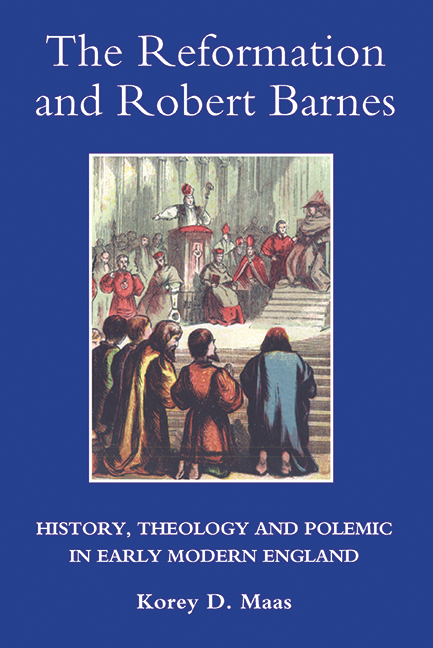Book contents
- Frontmatter
- Contents
- Dedication
- Acknowledgments
- Abbreviations and short titles
- Introduction
- Part I The Life and Theology of Robert Barnes
- Part II Barnes's Programme: History, Theology, and Polemic
- Part III The Reception and Revision of Barnes's Programme
- 6 The Evangelical Evaluation of Barnes's Programme
- 7 Robert Barnes: His Successors and His Legacy
- Bibliography
- Index
- Miscellaneous Endmatter
7 - Robert Barnes: His Successors and His Legacy
from Part III - The Reception and Revision of Barnes's Programme
Published online by Cambridge University Press: 11 May 2017
- Frontmatter
- Contents
- Dedication
- Acknowledgments
- Abbreviations and short titles
- Introduction
- Part I The Life and Theology of Robert Barnes
- Part II Barnes's Programme: History, Theology, and Polemic
- Part III The Reception and Revision of Barnes's Programme
- 6 The Evangelical Evaluation of Barnes's Programme
- 7 Robert Barnes: His Successors and His Legacy
- Bibliography
- Index
- Miscellaneous Endmatter
Summary
Despite the high regard in which the Latin works of Robert Barnes were held, the conclusion should not be reached that his English works were without influence. They clearly were. But, as suggested above, the extent to which they could be put to fruitful use was limited not only by the language in which they were written, but also by their doctrinally Lutheran leanings. To be sure, in the early days of the reformation, before confessional lines became rigidly fixed, and when much debate centred upon the doctrine of justification, such leanings were less controversial. So, for example, writing in the 1530s, Thomas Swinnerton showed no hesitation in recommending Barnes's Supplicatyon to his own readers, especially for its treatment of justification by faith. And even after the splintering of the reform movement there were those who, overlooking or reinterpreting Barnes's personal convictions, could make great use of the Supplication in internecine Protestant controversies. Thus the Puritan controversialist William Prynne relies heavily on this work in his refutation of Arminianism, chiefly citing Barnes's articles on justification and free will. Nevertheless, a survey of Prynne's works and the works of others reveals that many later theologians and polemicists found even the Supplication most useful for its historical data rather than for its doctrinal conclusions.
Barnes's works as early modern sources
Writing in the mid-seventeenth century, it is to Barnes's English work that Prynne will appeal when asserting that ‘their was no great Clarke in the Church of God this 400. yeares’, and that it was ‘the ancient policy of Lordly Prelates … to speake most against popery, when they are busiest to bring it in’. But it is also in the pages of the Supplication that Prynne finds the historical details in support of such assertions, especially as they relate to the church in England. He relies on Barnes, for instance, for his account of the contentious election of Canterbury Archbishop Stephen Langton in the thirteenth century, as well as for his account of the fifteenth-century Archbishop of York, Richard Scrope, inciting rebellion against King Henry IV. In the same work Prynne lifts a quotation of no fewer than twenty-one pages from the Supplication, in which Barnes had outlined the historical consequences of the papal oath of loyalty sworn by English clergy, often to the detriment of royal prerogatives.
- Type
- Chapter
- Information
- The Reformation and Robert BarnesHistory, Theology and Polemic in Early Modern England, pp. 206 - 226Publisher: Boydell & BrewerPrint publication year: 2010

